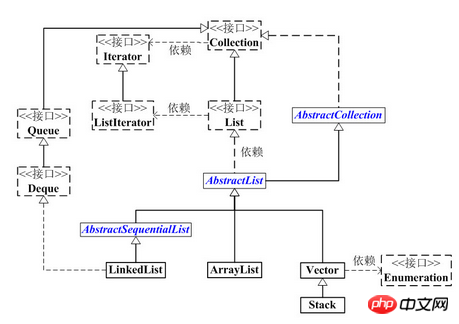Heim >Java >javaLernprogramm >Listencode-Analyse von Java-Sammlungen
Listencode-Analyse von Java-Sammlungen
- 黄舟Original
- 2017-03-13 17:28:511727Durchsuche
Liste erbt von der Schnittstelle der Sammlung. Die Liste ist eine geordnete -Warteschlange . Jedes Element in der Liste hat einen -Index . Der Index des ersten Elements ist 0 und die Indexwerte der nachfolgenden Elemente sind nacheinander +1 . Liste Doppelte Elemente sind zulässig.
Framework auflisten:

Quellcode der Listenschnittstelle:
public interface List<E> extends Collection<E> {
int size();//大小
boolean isEmpty();//判断是否为空
boolean contains(Object o);//判断是否包含某个对象
Iterator<E> iterator();//返回迭代对象
Object[] toArray(); //返回对象数组
<T> T[] toArray(T[] a);//对象数组
boolean add(E e);//添加某个对象
boolean remove(Object o);//删除某个对象
boolean containsAll(Collection<?> c); // 是否包含某个Collection的所有对象
boolean addAll(Collection<? extends E> c);//将Collection对象追加到List中
boolean addAll(int index, Collection<? extends E> c);//在某个位置将Collection对象追加到List中
boolean removeAll(Collection<?> c);//去掉Collection中所包含的对象
boolean retainAll(Collection<?> c);//去掉不包含在Collection中所包含的对象
default void replaceAll(UnaryOperator<E> operator) {
Objects.requireNonNull(operator);
final ListIterator<E> li = this.listIterator();
while (li.hasNext()) {
li.set(operator.apply(li.next()));
}
}
@SuppressWarnings({"unchecked", "rawtypes"})
default void sort(Comparator<? super E> c) {
Object[] a = this.toArray();
Arrays.sort(a, (Comparator) c);
ListIterator<E> i = this.listIterator();
for (Object e : a) {
i.next();
i.set((E) e);
}
}
void clear();//删除所有对象
boolean equals(Object o);//判断两个list是否相同
int hashCode();//返回List的hashCode
E get(int index);//返回某个位置的对象
E set(int index, E element);//替换某个位置的对象
void add(int index, E element);//在某个位置添加对象
E remove(int index);//删除某个位置的对象
int indexOf(Object o);//返回某个对象在List中的位置
int lastIndexOf(Object o);//List中最后一个对象的坐标
ListIterator<E> listIterator();//返回整个List的迭代
ListIterator<E> listIterator(int index); //从某个位置开始返回List的迭代
List<E> subList(int fromIndex, int toIndex);//截取部分List
@Override
default Spliterator<E> spliterator() {
return Spliterators.spliterator(this, Spliterator.ORDERED);
}
}
Das obige ist der detaillierte Inhalt vonListencode-Analyse von Java-Sammlungen. Für weitere Informationen folgen Sie bitte anderen verwandten Artikeln auf der PHP chinesischen Website!
Stellungnahme:
Der Inhalt dieses Artikels wird freiwillig von Internetnutzern beigesteuert und das Urheberrecht liegt beim ursprünglichen Autor. Diese Website übernimmt keine entsprechende rechtliche Verantwortung. Wenn Sie Inhalte finden, bei denen der Verdacht eines Plagiats oder einer Rechtsverletzung besteht, wenden Sie sich bitte an admin@php.cn
Vorheriger Artikel:Einführung in den grafischen Code von Set in der Java-SammlungNächster Artikel:Einführung in den grafischen Code von Set in der Java-Sammlung
In Verbindung stehende Artikel
Mehr sehen- Wie erstelle und verwende ich benutzerdefinierte Java -Bibliotheken (JAR -Dateien) mit ordnungsgemäßem Versioning und Abhängigkeitsmanagement?
- Wie funktioniert der Klassenladungsmechanismus von Java, einschließlich verschiedener Klassenloader und deren Delegationsmodelle?
- Wie kann ich JPA (Java Persistence-API) für Objektrelationszuordnungen mit erweiterten Funktionen wie Caching und faulen Laden verwenden?
- Wie implementiere ich mehrstufige Caching in Java-Anwendungen mit Bibliotheken wie Koffein oder Guava-Cache?
- Wie benutze ich Maven oder Gradle für das fortschrittliche Java -Projektmanagement, die Erstellung von Automatisierung und Abhängigkeitslösung?

